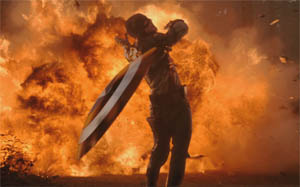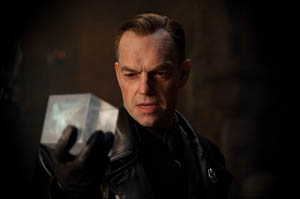|
When I first learned that a Captain America movie was in the works, my immediate reaction was to wonder just how that name would play in many other countries nowadays, who might've taken the opportunity to rename it Captain Imperialist Dog, or other such disparaging moniker. It's fortunate, then, that the filmmakers decided to return the character to his roots as a hero of World War II, just about the last war pretty much everyone could feel good about regarding a definitive right side and wrong side. Thus, director Joe Johnston has given us one of the few period superhero films, the other one of note being The Rocketeer, also by Johnston, who managed to take a lot of great elements and not quite get a great film out of them. So how does Captain America: The First Avenger fare? 
Ninety-pound weakling Steve Rogers is near-desperate to join the Army and help in repelling the Nazis, but his medical roster and sunken chest get him rejected for duty time after time. While attempting to enlist for the fifth time, he comes to the attention of German scientist Abraham Erskine, himself a refugee of Hitler's regime, who sees potential in the young man who refuses to quit, who harbors no ill will towards others but hates to see abuse of power. "Do you want to kill Nazis?" Erskine asks Rogers during his recruitment. "I don't want to kill anyone," the young man replies, though he knows he'll have to if accepted. His overall decency earns him a spot in a secret program to produce super soldiers. Erskine has borderline succeeded with his super soldier serum once before, on the other side of the conflict: the devious Johann Schmidt (a stellar Hugo Weaving), leader of the Third Reich's Hydra program, who believes occult power can be harnessed to make super-weapons, and who thinks Hitler is aiming too low in his ambitions. Within the last ten years, Hollywood has seemingly learned, at last, how to make comic-book movies work: ease off on the camp and just take the material as seriously as possible without overdoing the angst. Batman as a character is a darker persona, and thus benefits from the grittier tone he began taking on in the 1980s. Captain America is a livelier character from a less cynical time, and is served well by a slightly sunnier presentation. Quite believably, and with an eye that is both loving and satirical, the character starts off as a tool of wartime propaganda, used to drum up sales of war bonds. The rank-and-file soldiers don't perceive him as a hero, and neither does Steve Rogers, who feels his hard-bought abilities are going to waste. It's in his nature as a straightforward, good man, that Steve never buys into his own mythology, even after he's well and truly earned it. He's simply someone who wants, in the final analysis, to help his fellow soldiers; it's a sincerity that helps the material avoid sinking into square-jawed corniness. 
Where the film is a bit shaky, and where audiences may have trouble, is in the increasingly cross-pollinated nature of these Marvel movies. Iron Man, the first and still the best of the series, was a nicely self-contained adventure. With the clear intent of generating a broader story universe to be explored in the upcoming Avengers movie, Captain America is burdened in parts by baggage from previous entries and those yet to come. Schmidt's underexplained occult power source appears to have its origins in Thor's universe, while Steve's transformation and hero's journey is heavily facilitated by Iron Man's father Howard Stark. If these elements don't distract unduly, it's the ending that suffers most, as it occurs rather abruptly after having just begun to set up the next chapter in the story. It's also rather matter-of-fact over an outcome that needed to be treated with a touch more regretful melancholy. As a genre film, Captain America isn't defining in the way that The Dark Knight or even Iron Man were, but it's more satisfying than The Incredible Hulk or Thor. It's frankly much like The Rocketeer: a fun romp battling Nazis that doesn't end up having quite as much meat on it as I'd prefer. While too much of an edge would diminish its status as a crowd-pleaser, it at least doesn't shy away from the fact that soldiers in war shoot and kill people, and don't make bloodless combat with high-tech gadgets. It may not be the Normandy beach scene from Saving Private Ryan, but it does contain a few grisly deaths-though I personally felt that perhaps they went too far in the opposite direction with the appearance of the classic foe The Red Skull, whose visage could've been quite unnerving and instead isn't bothersome in the least. And while I wouldn't advocate a homogenous approach, the rest of Marvel's stable of films could do well to at least learn from the Iron Man films' sense of verbal wit. At least there's Tommy Lee Jones' Colonel Phillips around to provide a bit of wry humor. It may not be much of a stretch for the actor, but he does that sort of laconic, deadpan wisecracking better than almost anyone. -review by Matt Murray
|
|
||||||||